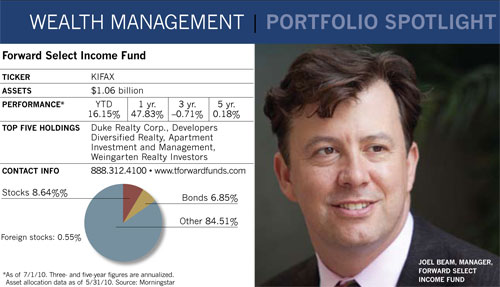As the real estate market continues to struggle, one bright spot has proved surprisingly robust over the last year. After a sharp downturn in 2008 and early 2009, securities issued by publicly traded real estate companies have staged a powerful recovery. As of mid-July, the Vanguard MSCI U.S. REIT Index ETF was up more than 72% for the trailing year, while the S&P 500 index was up only 25%.
The $1.06 billion Forward Select Income Fund, which invests mainly in REIT preferred stock, has followed a similar pattern. In 2008, the fund fell 40.5%. But it was up 75% in 2009, and is outperforming the S&P 500 index so far this year. Its 30-day SEC yield was recently close to 9%.
Joel Beam, the 40-year-old manager of the fund, says that common and preferred REIT shares reached such depressed levels last year that the bargains were hard to resist. In late 2008 and 2009, when the market was scraping bottom, he loaded up on those high-quality real estate companies he felt had been too pricey before the downturn. Forward Select Income often uses leverage to magnify buying power, and Beam borrowed heavily during the trough.

Since then, many of the stocks he bought have rebounded sharply.
Even though preferred REIT shares are more expensive than they were early last year Beam believes they still represent a good value by several measures. Many are trading at a discount to par. (Among preferred REITs, par value refers to the traditional offering price of $25 a share.)
Another measure of value, the yield spread between risk-free ten-year Treasury notes and preferred REITs, is still fairly wide. In July of this year, the Wells Fargo Hybrid and Preferred Securities REIT Index yielded 525 basis points more than the Treasury securities, well above the long-term average of 366 basis points. "At a minimum, the wide yield spread indicates the securities are not overpriced," he says.
Preferred stocks, the fund's mainstay, are a hybrid stock-bond investment paying a specific dividend that does not change. They are higher in the securities pecking order than common stock because if a company defaults, holders of preferred shares are ahead of stockholders (though behind bondholders) for payment. Issuers must also pay preferred dividends ahead of common stock dividends.
Common stock REITs tend to have a somewhat higher total return, he says, although a larger component of total return on the preferred stocks comes from yield. From its inception in March 2001 through the end of June, Forward Select Income has produced an 8% annualized total return, much of that coming from the yield component.
Beam observes that financial advisors often tell him they have trouble wedging preferred securities into their asset allocation models. "I tell people to look at preferred shares of real estate investment trusts as an alternative income vehicle. In terms of a risk profile, I'd say they are closer to junk bonds than anything else. But their default rate is actually lower."
While the last couple of years have been highly volatile for preferred REIT shares, Beam says that they are normally a tamer security than REIT common shares and have a relatively low correlation to other investments. They have a 0.78 correlation to REIT common stocks, a 0.66 correlation to preferred stocks and a 0.18 correlation to bonds.








